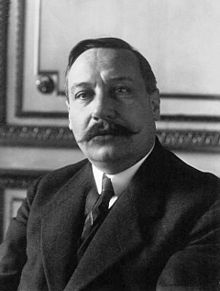This article needs additional citations for verification. (September 2014) |
Henry Franklin-Bouillon (3 September 1870 - 12 November 1937) was a French politician.[1]
Henry Franklin-Bouillon | |
|---|---|
 | |
| French parliamentarian | |
| In office 1910–1936 | |
| Constituency | Seine-et-Oise |
| Personal details | |
| Born | 3 September 1870 |
| Died | 12 November 1937 (aged 67) |
| Political party | Social and Radical Left |
| Other political affiliations | Radical-Socialist Party (1910-1928) |
Franklin-Bouillon was born in Saint-Hélier, Jersey.[1] He began as a member of the Radical-Socialist Party, but belonged to its furthest right-wing: he advocated that the Radical-Socialists join with Poincaré's alliance of centre-right and right-wing parties to oppose communism and socialism and support punitive military policy towards Germany. In 1927 these stances prompted him to lead two-dozen like-minded deputies to quit the Radical-Socialist Party, forming a mid-sized centre-right parliamentary party of Independent Radicals, named the Social and Radical Left group.
He met Mustafa Kemal Atatürk in Ankara in 1921 and they became close friends. In 1922 he travelled through the devastated areas by the retreating Greek army and after visiting the burned town of Manisa, he declared that out of 11,000 houses in the city of Magnesia (Manisa) only 1,000 remained.[2]
References
edit- ^ a b "Henry Franklin-Bouillon (1870-1937)". Bibliothèque Nationale de France. Retrieved 19 June 2024.
- ^ "Turks halt embarkation of all Smyrna refugees; Quit the neutral zone" (PDF). Rome Daily Sentinel. Retrieved 24 May 2014.
visiting the areas devastated by the Greeks. He declared that out of 11.000 houses in the city of Magnesia only 1.000 remained
- ^ "PARIS STATESMAN, LONG DEPUTY, DIES; Henry Franklin-Bouillon, 67, Former Head of Chamber's Foreign Affairs Body". New York Times. 13 November 1937.